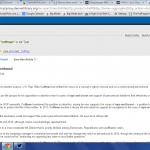Deleted Denver Post article stubbornly remains in Post digital archive
I was perusing the Denver Public Library’s Denver Post archive, on NewsBank, and smiled when I saw an article by former Post reporter Kurtis Lee titled, “Coffman shifts on abortion, personhood.”
That’s the story Denver Post Politics Editor Chuck Plunkett removed from the Post’s website hours after it was published April 16.
I clicked on the article, and there it was, complete and unabridged. It noted that “not long ago, Coffman won praise from hard-line pro-life groups for his opposition to abortion even in cases of rape and incest and support of personhood initiatives that effectively would have outlawed abortion in Colorado.” And it included Coffman’s response when asked to elaborate on why he abandoned his longstanding support for a personhood abortion ban: “There are parts of it that are simply unintended. … I think it’s too overbroad and that the voters have spoken.”
You recall the short-lived publication of the piece unleashed long-winded criticism from progressives, and, to his credit, Plunkett responded with blog posts of his own, explaining his decision to un-publish the piece and offering Coffman’s quotes and other new information in the disappeared article. But Lee’s original piece was never re-published on The Post’s website or in the newspaper.
Asked about the stubborn appearance of the article on The Post’s digital archive at the library, Plunkett said: “Once you take a story off your own web page, of course, it doesn’t mean it disappears from the internet. And here you’ve discovered that it still does exist, in fact, in an archive that we use. I just hope that all the stories that we put in [the archive] that we intend to publish stay in that archive. Every now and then I wonder. We sweat and bleed and go to all this trouble, and then we can’t ever find the stories again.”
Plunkett also said that he felt his blog posts at the time, containing the new information from Lee’s article, obviated the need to re-publish the piece. But if he had to do it over again, he would run the story with “one or two” additional paragraphs.
“Sometimes when you’re in the heat of the moment, you remember what you learned,” Plunkett said. “And what I learned was, if the story has something wrong with it, and it needs to be fixed, you pull the story and you keep working on it. In today’s environment, sometimes that’s not the smart move.”
